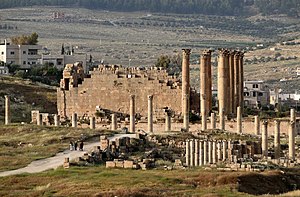The reading I picked this week is an excerpt from Rick Bragg's book "All Over But the Shoutin'." I've been trying to avoid reading or watching depressing stuff for a while now, really ever since my mom died, but the title seemed to jump out at me, so I went with it. It was sad. There's something awful about true stories that center on a terrible parent. Bragg's father is dying, and he's just the same to his son as he ever was. Bragg wants to resolve all the hurts from his childhood, but, as he's trying to come up with a way to do that, he gradually realizes that it's not going to happen.
When my mom was dying, she was in hospice care at home. We were all taking care of her, which was beautiful (I know that sounds strange, but it was beautiful in a lot of ways, mainly because she was a very good parent, definitely NOT the monster of our childhoods, and we felt as though we were doing something almost . . . holy with her--I can't think of a better way to put it) and horrible at the same time. After three or four days, she stopped talking because of the pain meds, but she was still pretty alert and reacted to what we said to her. I think we all managed to say everything we needed to say before she reached the point where she couldn't take it in. But, like Rick Bragg, I have issues that I know I will never get rid of unless I let it go, and again like him, I'm reluctant to let go, but in my case, it's because what I'd be letting go is valuable to me but so complicated and messed up that it would kind of be like trying to cut it out of myself. If that makes any sense.
Maybe you can see why I've been avoiding these stories.
This blog is meant to be used as an example for first-year composition students. Rhonda is a fictional community college student who will perpetually be taking the two-course sequence. This is her online writing and research journal (her 2012 research entries run from 1/20-5/5/2012; Eng101 reading journal that year runs from 8/22-12/5/12). For an explanation of the course, see below for Rethinking Teaching the Research Paper.
Showing posts with label freshman composition. Show all posts
Showing posts with label freshman composition. Show all posts
Friday, February 2, 2018
Saturday, August 26, 2017
Time to Get Going!
 |
| books I got from library for this semester :) (Photo credit: Wikipedia) |
Which brings me to my main problem: organization. This time, I'm going to make a schedule and stick to it (just so you know, I said this every semester throughout high school--and I usually fell apart after a few weeks). It seems to me that publishing that statement for the entire world to read if they want to will make me feel more committed. This and my profile are probably all anyone needs to know about me.
Related articles
Monday, February 1, 2016
Men's Studies and Avengers: Age of Ultron
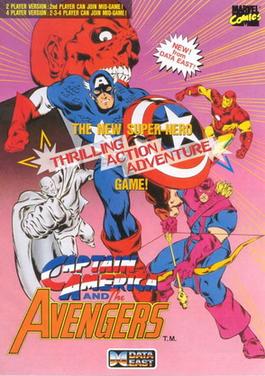 |
| Captain America and The Avengers (Photo credit: Wikipedia) |
I've got a lot of thinking to do, and a proposal draft due on Wednesday, so I'd better get to it.
Related articles
- Hot Toys Fully Displays More Superhero Figures From CAPTAIN AMERICA: CIVIL WAR Collection (comicbookmovie.com)
- "War Hammer" Joins the Fray in This New Captain America: Civil War Art - Wait, Who? (io9.gizmodo.com)
- 'Spider-Man' Star Tom Holland Spotted On 'Doctor Strange' Set - Will He Make A Cameo? (designntrend.com)
- New Summary for Captain America Civil War' Released (newsghana.com.gh)
Tuesday, January 20, 2015
When a student loses steam
Those of us who teach first year composition are (sadly) very familiar with students who find themselves in over their heads. The nature of a writing class is grounded in near constant writing, and it takes a while for some students to get up to speed. This last term that happened to Rhonda. Between her family situation, her job, and her courseload, she had a lot to handle. The biggest problem she faced as a student was time management. She tried to complete the major projects, but often forgot about Project 1: her blog. By the end of the term, she found that there was no way that she could catch up and complete the last two projects plus the required number of blog entries. She came to my office hours two weeks before the final, looking for some kind of a solution, but (as you can imagine) it was too late for that. If she had come to see me even a couple of weeks earlier, I'm fairly certain that we could have worked it out, but she just waited too long. She had to drop the course.
Rhonda's problems have had an impact on me-- from now on, I'll be checking in on my students' blogs more often over the semester, and I'm thinking about requiring them to come to my office hours at least once during the first 8 weeks of the term. We'll see how this works out.
As a final note for those who follow this blog, you should know that Rhonda will be taking 101 this spring (doing the whole 2014-2015 school year in reverse).
Related articles:
"10 Common Problems Students Face During College" - the comments here are also useful.
"What are the Biggest Issues Facing Community Colleges Today? New Study has Answers." This article from the Community College Review discusses the issue of college readiness.
Sunday, August 24, 2014
Rackin' up the Nerd Points! or, How I Spent the Last Week of my Summer Vacation
 |
| Paul McGann as the nearly forgotten 8th Doctor. Q: Who played the Master? |
Tonight we're going with her Whovian pals (yes, I speak some Who) to see the season premiere of Dr. Who (which we already watched on tv last night) at a theater in Woodridge. BBCAmerica was running old episodes non-stop all this last week, and we saw most of them. Rebbie says she is going to give me a test later. I'm ready-- the answer to the question under the picture above is Eric Roberts.
To my First Year Comp Colleagues: The Ongoing Pedagogy Project
(note: Rhonda will be back later today)
Those of you who have been following this blog are already aware that my goal here is both to provide a sample for my 101 and 102 students and to present a method for creating a realistic research paper assignment, i.e. one that is representative of actual assignments in college courses. If you haven't read the initial material, there are links above.
Since my department is shifting to new textbooks this term (Ruszkiewicz, John J. and Jay T. Dolmage. How to Write Anything: A Guide and a Reference with Readings. 2nd ed. Boston: Bedford/St. Martins, 2012, and Ruszkiewicz, John J. A Reader’s Guide to College Writing. Boston: Bedford/St. Martins, 2014), this seems like a good time for a brief progress report. Over the past few years, the most obvious result has been a decrease in students dropping the course, which has been my greatest encouragement. In addition, the problems I've seen students having are the same ones we all see every semester: writing issues, difficulty with time management, critical thinking skills that aren't yet up to the material, etc (here in Illinois, high schools apparently focus primarily on 5-paragraph essays, with the result that many students can't immediately grasp the reality that those won't work at the college level: for some, it's a kind of security blanket, and they resist the change). All of these are college-readiness issues that should have been addressed before they enter our classrooms, but that doesn't seem likely to happen anytime soon. So, as far as the things I can control go, this project is producing a quantifiable benefit.
New versions of the assignments and critical model packet will be available shortly (links will be on the left).
Finally, my thanks to those who sent condolences after my mother's death. I am very hopeful that the gaps in posts that have marked this year to date will not be necessary again.
And now, Rhonda is up next. She is taking 102 this term, so if you need a 101 example, use the Fall 2011 or 2012 entries.
Those of you who have been following this blog are already aware that my goal here is both to provide a sample for my 101 and 102 students and to present a method for creating a realistic research paper assignment, i.e. one that is representative of actual assignments in college courses. If you haven't read the initial material, there are links above.
Since my department is shifting to new textbooks this term (Ruszkiewicz, John J. and Jay T. Dolmage. How to Write Anything: A Guide and a Reference with Readings. 2nd ed. Boston: Bedford/St. Martins, 2012, and Ruszkiewicz, John J. A Reader’s Guide to College Writing. Boston: Bedford/St. Martins, 2014), this seems like a good time for a brief progress report. Over the past few years, the most obvious result has been a decrease in students dropping the course, which has been my greatest encouragement. In addition, the problems I've seen students having are the same ones we all see every semester: writing issues, difficulty with time management, critical thinking skills that aren't yet up to the material, etc (here in Illinois, high schools apparently focus primarily on 5-paragraph essays, with the result that many students can't immediately grasp the reality that those won't work at the college level: for some, it's a kind of security blanket, and they resist the change). All of these are college-readiness issues that should have been addressed before they enter our classrooms, but that doesn't seem likely to happen anytime soon. So, as far as the things I can control go, this project is producing a quantifiable benefit.
New versions of the assignments and critical model packet will be available shortly (links will be on the left).
Finally, my thanks to those who sent condolences after my mother's death. I am very hopeful that the gaps in posts that have marked this year to date will not be necessary again.
And now, Rhonda is up next. She is taking 102 this term, so if you need a 101 example, use the Fall 2011 or 2012 entries.
Tuesday, January 21, 2014
Getting a jump on the new semester
 |
| Cover via Amazon |
For me, spring semester starts tomorrow, but I just checked and my English 102 class is already set up on Blackboard. I read the syllabus and the first assignment, which is to set up a blog and do 20 posts by the end of term. The first post has to be about the topic for my research project, which has to be a film. I looked at the list of films, and the one that jumped out at me was The Four Feathers (all the rest are newer movies), probably because Rebbie (Rebecca, my older sister, who had a big Heath Ledger crush) made me watch it with her when she first got the DVD. It was pretty intense for me, since I must have been about eight or nine years old at the time. I've seen it since then -- and I have a better understanding of what's going on in it than I did as a kid -- so I think I'm going to go with it.
I also have to have a "critical approach," which I'm not quite sure I understand yet, and the one it was listed under is something called shame theory. This makes sense to me. If you haven't seen the film, it might not make sense to you. The feathers in the title are symbols of cowardice that people give to men who have acted cowardly in some major way. The hero of the story is a British army officer who resigns when his unit (or whatever it's called) is ordered into action. He does this because he is afraid, and then he spends the rest of the film doing incredibly brave things in order to give the feathers back and redeem himself. Basically, now that I think about it, it's all about shame.
I'm not sure how this is going to work, but I guess I'll find out more tomorrow morning (assuming we don't have a blizzard or get frozen by a polar vortex again).
Related articles
- Impact of Polar Vortex Cold Blunted U.S. Economy...Except for Plumbers (rotorooter.com)
- New Semester (ac521.wordpress.com)
Wednesday, April 3, 2013
4 AM Reflections on Writing, of all things
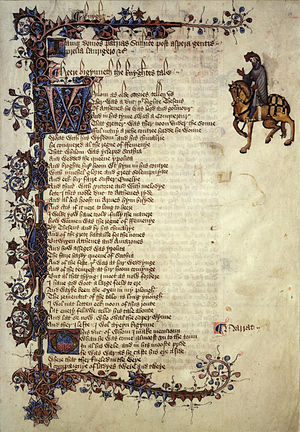 |
| English: Scan of Ellesmere manuscript of Canterbury Tales. The first page of Knight's Tale. (Photo credit: Wikipedia) |
This is a first for me. I've never commented on anything before, and even now, it kind of makes me nervous, just the way this blog does. I would never have started a blog on my own if it hadn't been a requirement of a course, because I feel as though I'm asking to be judged by others when I put my work out there. It's uncomfortable, thinking about strangers reading what I write, but I guess doing this blog all semester has made me less worried about what other people think of my writing.
Still don't feel sleepy. I'll try working on my draft some more -- no point in wasting this time.
Related articles
- Pop culture: An Overview (hridenour.wordpress.com)
- So, I'm going to blog. (cutegirlwithabanjo.wordpress.com)
- Blog Posts to Resume Wednesday (asheathersworldturns.wordpress.com)
- Two more pitch opportunities for an Agent and Soul Mate Publishing April 3rd (victoriapinder.wordpress.com)
Friday, March 29, 2013
Overt and Covert Agendas
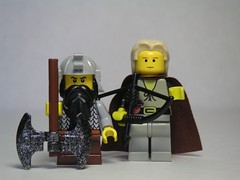 |
| Gimli and Legolas (Photo credit: Dunechaser) |
And, Gimli is obviously in agreement that the ring must be destroyed-- it could be because of the possibility of the elves getting hold of it, but he seems to accept that it has to be done for whatever reason, so he hops right up and tries to smash it with his battleaxe, which shatters on impact, leaving the ring undamaged, unlike Gimli himself, who seems to have been injured in the attempt. The most likely reason he joins the quest then, based on that evidence, is simply to destroy the ring, but he uses his anti-elf prejudice as a justification. This is ironic, since he has only the word of Elrond, the elf, that it must be done. Which leads me to wonder, what about Elrond? What are his expectations or hopes for this council? His behavior is sort of alien, in the non-human sense, or maybe it's just that he is a kind of king among elves and tries to stay above the rest of them. This idea is probably not going to find its way into my paper, but it's interesting anyway.
Related articles
- The Lord of the Ring (pendepaz.wordpress.com)
- Could the eagles have flown Frodo into Mordor? (sean-crist.com)
- Lord of the Rings Movie Series- Pros and Cons (classicalconversationsgirl.wordpress.com)
Thursday, February 21, 2013
My Working Thesis Won't Work
 |
| Dwarves at the Council of Elrond in Peter Jackson's The Lord of the Rings: The Fellowship of the Ring. (Photo credit: Wikipedia) |
Just now I thought, or remembered, that I'm confined to the first film (which I have sort of been ignoring), and I'm wondering if you can really tell from FOTR alone that each one is a hero. I mean, it's obvious once the entire trilogy is over, but at the end of the first film, Frodo and Sam have gone off on their own, Boromir and Gandalf (supposedly) are dead and the rest are split, with Merry and Pippin captured by orcs and Aragorn, Legolas, and Gimli trailing them.
And, I just thought of something else that deserves its own post, so that's all for now.
Related articles
- Ten Years Later - The Cast of 'Lord of the Rings' (Part 1) (houseofgeekery.com)
- Government Department Offers New Research-Oriented Courses (thecrimson.com)
- Fellowship of the Ring: Meriadoc Brandybuck (starrymantle.wordpress.com)
- Startup Connects Students to Research Resources (thecrimson.com)
- Lego Lord of the Ring Video Game Coming To Mac (thelazygeeks.com)
Sunday, November 4, 2012
It's Finally Finished
 |
| English: A map of the fictional nation of Panem from Suzanne Collins' "The Hunger Games." (Photo credit: Wikipedia) |
The final revision of my critical analysis paper on The Hunger Games is done, or at least as done as it will ever be, and I turned it in. I feel like I've been let out of prison! I don't have to think about the movie anymore, and I can get on with the rest of my work. I'm glad that the paper was due now; all the major projects for my other classes are due in the last two weeks of the semester, and having this one out of the way means a lot in terms of time. All I have to do for English 101 is the application letter/résumé and a portfolio, which ought to be a breeze. Oh, and there's still a test on the textbook readings and a final exam, but I'm not going to worry about them now.
One thing I have noticed is that what Dr. Toffee calls my "writing process" has changed. I always thought of revising as being mostly correcting errors, but now I get it. In fact, right now, I realize that I'm not following the prompt for this week. I'm supposed to be writing about "The experience of developing and writing" the critical analysis essay, and I really should revise this post to fit that. But I'm not gonna!
Related articles
- XTRA CREDIT/FINAL eXAM (socmedgsucourse.wordpress.com)
Saturday, November 3, 2012
Face to Face on my Horrible Draft
| English: South facade of the Temple of Artemis seen from the South Theatre in Jerash, Jordan (Photo credit: Wikipedia) |
A couple of days after the peer review on my critical analysis draft, I read it again. Suddenly, it was horrible. I don't know how this happened. So, I went to my conference with Dr. Toffee last week under a cloud of angst. It wasn't too bad. She suggested a few tweaks for my thesis statement, and -- for once -- I saw what was wasn't working in the way I had put it. She liked my explanation of my critical model, especially the parts about Artemis and Atalanta; I was kind of nervous about that, so it was a relief for me. The analysis has to be reorganized some. I need to put in a few references to other scenes from The Hunger Games to show that it's not just in the scene I'm focusing on that Katniss is following the archetypes.
All in all, it went okay. I guess the draft wasn't as horrible as I thought.
Related articles
- Hunger Games Horrible Lip-Reading (kiss951.cbslocal.com)
- Francis Lawrence To See Out The HUNGER GAMES Series (badassdigest.com)
- 105WS Investigative Story: Prospectus with Annotated Bibliography (drkblog.wordpress.com)
Rita Dove's The First Book
| Cover of Bride of the Rat God |
This is now one of my favorite poems. It's so simple, yet it says everything it needs to say about that moment when you first hit upon the book that turns you into a reader. I'm pretty much a "narrative junkie," with a two-book-a-day habit, and since the semester started, I'm about 30 books behind. Yeah, I'm reading a lot for school, but it's not like I'm reading stories. And I've gotten really cranky over not having the time to read for myself. This is the reason I stopped posting for a while: I needed to read.
So, what did I read? I re-read a couple of favorites, Barbara Hambly's Bride of the Rat God (since it just came out on Nook-- I love that thing!) and Johnny Tremain by Esther Forbes (another Nook download; I read this in fourth grade and it's still as good as I remember), as well as four free-Friday Nook ebooks. I've been reading Norwegian mysteries by Jo Nesbo; they are fascinating and disturbing. My sister loaned me her Hamish MacBeth mysteries (by M. C. Beaton), and they should take me through to the holidays.
I feel so much better now.
Related articles
Saturday, October 13, 2012
Peer Reviews
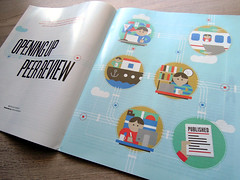 |
| Peer Review opening illo for UA/AU - Canada (Photo credit: albyantoniazzi) |
On the other hand, the paper I reviewed taught me a lot. It was not by the guy who was reviewing mine, which was a good thing, since if I had gotten his review after working so hard on mine, I'd be really pissed at him. Anyway, I think I learned as much from the things in the paper that were bad as I did from the good stuff, mostly because I did some of the bad things, too, but I didn't notice them in my paper until I saw someone else do it.
Next week is the conference about revising my paper.
Related articles
Sunday, October 7, 2012
Politics, Power . . . and Harry Potter?
| Harry Potter and the Goblet of Fire (Photo credit: Wikipedia) |
My draft has hit a bad spot, so I thought I'd get a jump on this week's postings, especially since there's a checkpoint this Friday. We're reading "literary analyses" this week, and I picked an essay by Philip Nel, called "Fantasy, Mystery, and Ambiguity." Don't be put off by the title -- it's actually about Harry Potter, or at least the first four books.
Nel makes a point that reminded me of a whole bunch of things at once. He writes, "As the series develops, it grows increasingly interested in questions of power: who has it, who has the right to exercise it over another, who has the moral authority to wield it, and how it should be exercised" (750). He goes on to talk about the political aspects of the books, and that made me think of my project. I'm not looking at politics in The Hunger Games, but it's a HUGE part of the book, if not the film. All the characters are living in a fascist dictatorship, where the people in the Capitol are wealthy and privileged, while the majority of the population (the Districts) lives on the brink of starvation and is forced to abide by the ideology of their distant rulers because the Districts have been made the scapegoats for a civil war that happened over seventy years earlier. Sounds kind of like Nazi Germany, doesn't it? And Harry Potter's world is headed in that direction in the first four books, too, what with Voldemort's supporters attacking Muggle-born wizards (I was really amazed when I realized that there are a lot of points in common between the last Harry Potter book, The Hunger Games, and the Nazis).
Since the tv was on while I was reading, I heard probably four or five political commercials before I finished the article, and I saw a connection there, too. Which was scary.
Related articles
- J.K. Rowling: More Harry Potter Possible (entertainment.time.com)
- 5 of Our Favorite Beauty Features From the Ladies of Harry Potter (bellasugar.com)
- The Return of . . . Harry Potter Character or Nail Polish Shade? (bellasugar.com)
- JK Rowling: 'The Casual Vacancy' is just like Harry Potter (telegraph.co.uk)
Friday, October 5, 2012
The Broody Mr. Bond? Step Aside, Daniel Craig!
I'm supposed to read an argument from the Norton Field Guide to Writing this week, and I looked at all of them, but they all seemed too depressing, so I went to another chapter (on evaluations) and read a 2008 New York Times movie review by A. O. Scott. The film he's reviewing is Quantum of Solace. By a TOTAL coincidence (really!) today is the 50th anniversary of James Bond on film, too, so I figure this is what I'm supposed to do.
My dad is a HUGE James Bond fan, has all the movies (and the books), which means I've grown up seeing them, so this looked interesting. But the first thing I noticed, probably because I'm working on my draft, was the way Scott wrote his review -- he's basically following the same pattern I was told to use for my paper. He begins by explaining his "critical paradigm," which, it turns out, is a checklist of all the things you expect to see in a Bond film, then he evaluates (I won't be doing that, just analyzing) how well the film does at meeting each item's audience expectations.
Well, according to him, it has hits and misses on things like action and gadgets, but he comes to a halt with the checklist when he reaches the category of "babes." This is because in this film, Bond is just not interested. Scott writes, "what gets in the way is emotion. 007's grief and rage [. . .] are forces more powerful than either duty or libido" (738). I saw the film, and I think he's right, but then he goes on to say, "Mr. Brosnan was the first actor to allow a glimmer of complicated emotion to peek through Bond's cool, rakish facade," and this was where I came to a halt.
No, Mr. Scott. It was Timothy Dalton who did that, in Licence to Kill. This is the film where Bond is out to avenge his friend Felix, remember? Even before that in the film, Felix's new bride makes a comment about how Bond should get married, and the look on Dalton's face is not a typical Bond look (which would be a smile and shake of the head, I guess). Instead, he somehow manages to convey that there is a TRAGIC EVENT in his past -- presumably his own wedding, in On Her Majesty's Secret Service -- that means he will never get married . . . again (don't ask me how he does this; look at it for yourself!). If that ain't a complicated emotion, what is?
Pierce Brosnan? Pah! Don't make me laugh.
BTW, my vote for best Bond is Connery, Dalton second, and Craig third. Roger Moore makes me cringe, and Brosnan (I've liked him in other things) just doesn't grab me as Bond.
Related articles
 James Bond films celebrate 50th anniversary
James Bond films celebrate 50th anniversary Global James Bond Day as the Golden Anniversary of 007 is celebrated
Global James Bond Day as the Golden Anniversary of 007 is celebrated Picking The Best Bond: Connery And Craig Rise To The Top
Picking The Best Bond: Connery And Craig Rise To The Top The 10 Highest-Grossing James Bond Films Of All Time
The 10 Highest-Grossing James Bond Films Of All Time For Your Ears Only − Ranking The 22 Bond Theme Songs From Worst − Sorry Jack and Alicia! − To Best
For Your Ears Only − Ranking The 22 Bond Theme Songs From Worst − Sorry Jack and Alicia! − To Best James Bond girls through the last 50 years
James Bond girls through the last 50 years JAMES BOND: 'Roger Moore Was Never Sexually Threatening'
JAMES BOND: 'Roger Moore Was Never Sexually Threatening'
Friday, September 21, 2012
Hit or Myth?
 |
| Atalanta and Maleagar (Jacob Jordaens) |
Dr. Toffee has The Hunger Games in the Women's Studies category, but I've decided to use a myth criticism approach. The way I understand it, I can discuss the characters and setting as archetypes and the scene I select as to where it fits into the pattern of the hero's journey. What's interesting to me about this has to do with there being few archetypes of female heroes, which means I'm going to have to figure out which one of the male archetypes she fits. And, since I have to talk about that male to female transformation (for lack of a better word), I'll be generating material for the paper right there! It's a win-win choice.
Related articles
Subscribe to:
Posts (Atom)












